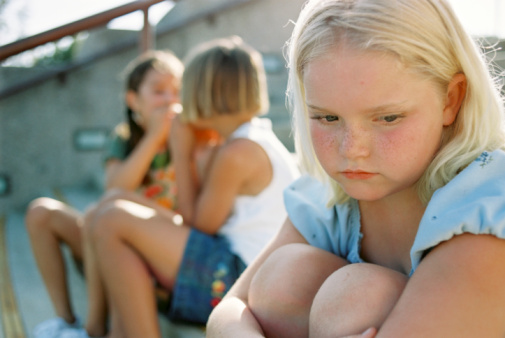In an environment such as school, where there may be academic and social pressures and children are pitched against their peers, attempting to gain one up on others might be seen as a natural reaction in those who are struggling. It can help bullied children to understand that their tormentors are often victims themselves. Often, seeing someone through a different filter e.g. as a victim, can help us to feel more compassionate towards them, and thus less likely to feel that the attack is personal, even if the words chosen are.
A school’s role
Schools need to take an active role in preventing bullying. When choosing a school for your child, it is worth asking questions on this topic and getting to the bottom of what a vague ‘anti-bulling campaign’ actually entails on a practical level. Are there older mentors who can support younger children? Is bullying, and a no-tolerance attitude towards it, discussed openly with the children? Are children encouraged to pursue their own interests and beliefs, even if they are different? Most pertinently, are children taught the value of self esteem and ways of cultivating it? Ask the head for specific examples of how the school embraces diversity and tackles bullying at ground level. Parents of sensitive children may fear that their child is more prone to misunderstanding from their peers, and less able to fend off unkindness or cruelty. If you have real concerns in this area, it may be worth looking for a school that caters to more sensitive souls and creates a homely environment in which they can flourish.
Cultivating self esteem
Self esteem is the most important tool a child can take into the world with them. Even adults face bullying – in the workplace and at home – and a strong sense of self-esteem can either deter these situations from arising or quash them when they do. Being able to stand up for yourself, and know when a situation is unacceptable, empowers an individual. I remember a girl at my school who was unique in every way, but was rarely picked on by bullies (of which there were a lot) because of her strong personal integrity. It seemed she was of no interest to them when they realised she wouldn’t crumble under their attack. Equally, I remember other children who were constant victims of bullying – of extreme interest to the bullies because they possessed a fragile sense of their own self-worth and the attacks had immediate and evident effect.
Social media
With most children having some kind of access to social media, cyber-bullying has become a much more prevalent problem. Recent headline cases of children committing suicide because of online bullying reveals what a tragic situation this can become. Online bullying is much more difficult to police as perpetrators can hide behind anonymity, but it may help your child to understand that that is exactly the reason online bullies can be so cruel: because they don’t have the guts to reveal themselves. It might be worth limiting online time if you think this might be a problem for your child, and discussing with them how to keep personal information private. Keeping an open dialogue about alcohol and drugs is also sensible, as photographs of drunk teenagers posted online the day after a party can be incredibly upsetting. This kind of situation links back to self-esteem: a teenager with a strong sense of self-worth is less likely to put themselves in situations in order to fit in or gain confidence. Building a strong relationship with your teen through attentive listening and as much one-on-one time as you both can manage, will ensure that your child is much likely to turn to you for help, rather than hide their feelings or concerns. A non-judgemental attitude also pays dividends if your child finds themselves in a sticky situation: yelling at them for getting drunk at a party when they tell you they’re upset about pictures posted on the internet means they’re far less likely to seek your confidence in future. Aim to offer reassurance and comfort whatever their mistakes – teenagers are bound to get in problem situations now and again. You’re not condoning the behaviour, but trying to help your teen find ways to solve a problem with your love and support.
Here are some ways to help your child deal with bullying:
Ensure your child feels listened to and heard. Repeat back what they have said to you to make sure you have taken the information on board correctly, without blurring the story with your own reactions and emotions.
Make sure your home is a safe, comforting place to return to. If your child is the victim of bullying, home is going to be the place where they process the feelings of fear, powerlessness and anger. If you suspect your child is being bullied, but they haven’t talked to you about it, create a safe space of one-on-one time for them to do so and ask open, non-confrontational questions.
Talk to your child about their feelings, and encourage them to put themselves in the bully’s shoes. What does the bully gain from being unkind? Why might they act the way they do? It can help your child to see the bully as a scared child trying to get power over someone else.
Celebrate your child’s skills, abilities and uniqueness. Constantly reiterate what makes your child special, and why they bring so much love, laughter and joy into the world. Get them to write a list of all the things that make them great, and to memorise it for when they feel picked on by others. Focusing on a point in the future when they will bring those unique gifts to fruition can also be helpful, as they won’t always be stuck at school with bullies who don’t see their unique light (or see it, and are jealous of it).
Give your child affirmations to mentally repeat to themselves when they need to, such as ‘I am strong, I am beautiful, I am powerful’. Perhaps you have a crystal or similarly small-sized object that your child could hold when repeating these affirmations – just reaching for it in a pocket can help (hypnotherapists sometimes use objects or a simple finger to thumb hold to release positive emotions at a later date). If your child is older, it might help to introduce them to the notion of compassion. If it comes from a powerful sense of self love, compassion towards an aggressive or unkind person can be a disarming tool.
Teach your child that there are some things we cannot control, such as another person’s behaviour, but others that we can, such as our reaction to it. Getting caught up in the bully’s power struggle will only make their behaviour worse, so having tools to calmly and firmly respond to them will help.
If the situation is serious, talk to your child’s school about taking a pro-active role in tackling it. Have a clear idea of specific incidences and discuss with them what they aim to do about the issue. Arrange to have a follow-up meeting to talk about progress.
Learning skills to cope with bullying and ways to deal with stress (meditation, affirmations, a healthy diet, exercise etc.) will give your child tools for life. There will no doubt be occasions in the future when they are faced with a challenging co-worker or difficult friend, so arming them with a deep sense of their own worth in the world is a gift.
SEEK ADVICE
There is lots of advice out there for concerned parents. Check out some of these websites for more information:
• www.bullying.co.uk
• www.kidscape.org.uk
• www.besomeonetotell.org.uk
• www.anti-bullyingalliance.org.uk
18-22 November is Anti-Bullying Week. For resources and more information, visit the website here http://www.antibullyingweek.co.uk/
Read more:
Bullies, Bigmouths and So-called Friends by Jenny Alexander
This comes highly recommended on Amazon – a book aimed at children with fun cartoons and personal exercises to try, written in a warm and accessible style. About boosting self-esteem.
Stick Up for Yourself: Every Kid’s Guide to Personal Power and Self-Esteem by Gershen Kaufman
Written by a professor in clinical psychology, this book features issues like responsibilty, making choices, ownership of feelings, and believing in yourself.
Seven Day Bully Buster (The 7 Day Series) by Jenny Alexander
Jenny Alexander understands children and writes in a way they can relate to. Here, she details a seven day programme parents can undertake with their kids to help them build strong self-esteem. This features special one-on-one time with a parent, talking through feelings.







